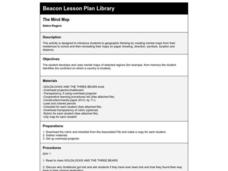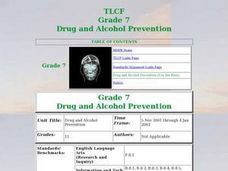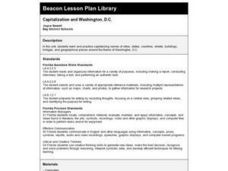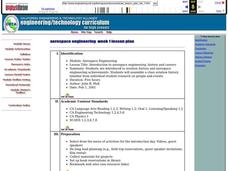Curated OER
Why Plants Are Important to Us
First graders explore plant life. In this plant lesson, 1st graders examine various plant life and categorize them. Students graph their data and make journal entries regarding their work.
Curated OER
Letter to a Leprechaun
Students write a persuasive writing paper telling a Leprechaun why they should share their gold with the student. In this persuasive writing lesson plan, students write about what they would do with their pot of gold.
Curated OER
Jars of Clay
Students make jars of clay to represent the jars used in the Hanukkah story. In this Hanukkah lesson plan, students use clay, sculpting tools, and can be completed with model magic.
Curated OER
The Progressive Era: Muckrakers Grade 8
As you explore an excerpt from Upton Sinclair's The Jungle with your class, discuss how his descriptions of the meat-packing industry caught the public's attention and helped to promote change in the Progressive Era.
Curated OER
Active and Passive Listening
Eighth graders practice passive and active listening skills. They discover listening skills help them communicate more effectively. Students analyze the benefits of having someone to listen to them actively and the benefits of being an...
Curated OER
Comparing Works By The Same Author: Venn Diagram
A Venn diagram is a great tool. Middle schoolers research specific authors from different time periods, cultures, and genres. In groups, they create a Venn Diagram in order to compare and contrast two pieces of literature by the same...
Curated OER
Compare and Chart the Stories
Elementary schoolers engage in a literature study. They make comparisons of two different versions of a story using a graphic organizer. Using the text and pictures elementary schoolers investigate three elements from the story. Then,...
Curated OER
Pass It Down
Students in varying grades work cooperatively to create a living museum of items that have been "passed down" through generations. They give a brief oral presentation showing their object (or a picture of it) and describing its history...
Curated OER
The Mind Map
Learners form a mental map of their residence in relation to school and recreate it on paper showing distance, direction, location and symbols. This instructional activity is designed to introduce students to geographic thinking.
Curated OER
Drug and Alcohol Prevention
Seventh graders investigate the influence of alcohol and/or drugs. They prepare a written report on the chosen topic related to drugs and/or alcohol. Students utilize technology to share the information about alcohol and/or drugs with an...
Curated OER
Sea Changes: A New England Industry
Young scholars conduct research in order to use primary and secondary sources. They interpret and analyze information from textbooks and nonfiction books for young adults, as well as reference materials, audio and media presentations,...
Curated OER
Using Context
Teams practice decoding and using context strategies to determine the meanings of unfamiliar words. After verifying the meanings of words through the use of dictionaries, the Internet, thesauruses, and other sources, learners write the...
Curated OER
Sumerian Creativity
Sixth graders examine Sumerian inventions. Using the internet, 6th graders view images of the inventions and create a poster of the images. They create a PowerPoint presentation, with video clips, of Sumerian inventions to share with the...
Curated OER
How to Write A+ Essays!
This lesson, which promises to improve the essays of your middle schoolers, contains a list of characteristics an essay should include. It breaks it down into the introduction, thesis statement, body, etc. There's also a list of things...
Curated OER
Speak a Little Clearer!
What are the characteristics of effective public speaking? Emerging orators choose a fairy tale to present orally to the class. After modeling yourself, divide the class into small groups, having them critique each others' oral...
Curated OER
Special Places in Our Community
Students compare and contrast cities whether they are large or small, rural or urban. They use digital photography to take pictures of the different types of cities.
Curated OER
Researching Another Country's Holiday: Focusing and Gathering Information
Fifth graders brainstorm a list of holidays celebrated by a majority of people in the United States. They each select an American holiday from the list as well as another country that may have a holiday that is similar. Next, they...
Curated OER
Enjoying the Adventure
Middle schoolers watch the video of "The Prince and the Pauper" and analyze, compare and contrast the characters. They write letters to a character from the point of view of another character and create a new ending to the play.
Curated OER
Symbols and the Choices we Make
Upper elementary and middle schoolers recognize symbols that influence the choices that we make consciously or unconsciously in everyday life. They look at the symbols and choices that others make. They identify and apply knowledge of...
Curated OER
MiniZine Writing Project
Young scholars write on a chosen topic. Students brainstorm topics and practice writing on the topic using a variety of templates. Young scholars print a final work and fold it in half to create a Mini Zine.
Curated OER
Growing a Seed
Seeing how seeds grow into plants is such an enjoyable for students! They plant lima bean seeds and take pictures to record the growth of their plants. Students write in a journal to describe their daily observations of their plants, and...
Curated OER
Capitalization and Washington, D.C.
Second graders learn and practice capitalizing names of cities, states, countries, streets, buildings, bridges, and geographical places around the theme of Washington, D.C. through activities at learning centers in the classroom.
Curated OER
Aerospace Engineering
Learners are introduced to aviation history and aerospace engineering achievements. They assemble a class aviation history timeline from individual student research on people and events.
Curated OER
Report on Desert Plant or Animal
Students are introduced to desert plants and animals. They demonstrate that the name of an organism does not always match the object. Students perform a guided internet search in order to complete a report.























